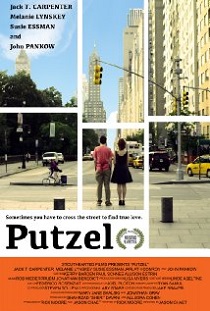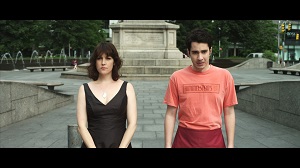 Some movies start with a character, and others with a gimmick, and still others from a unique story idea. Putzel is definitely a gimmick picture, for it begins and ends with the notion that a fully-grown, 30-ish year old man’s phobia about leaving Manhattan’s Upper West Side is enough to carry an entire picture. The guy in question is Walter (Jack T. Carpenter), though everyone in his neighborhood affectionately refers to him as “Putzel.” Walter explains later in the film that it is a Yiddish slang word meaning dummy, schmuck, or more literally, penis, and like some kind of abandoned love child sprung from the loins of Bob Newhart and Woody Allen, the ineffectual Putzel definitely lives up to his moniker.
Some movies start with a character, and others with a gimmick, and still others from a unique story idea. Putzel is definitely a gimmick picture, for it begins and ends with the notion that a fully-grown, 30-ish year old man’s phobia about leaving Manhattan’s Upper West Side is enough to carry an entire picture. The guy in question is Walter (Jack T. Carpenter), though everyone in his neighborhood affectionately refers to him as “Putzel.” Walter explains later in the film that it is a Yiddish slang word meaning dummy, schmuck, or more literally, penis, and like some kind of abandoned love child sprung from the loins of Bob Newhart and Woody Allen, the ineffectual Putzel definitely lives up to his moniker.
Walter works in his family’s smoked fish and bagel shop, Himmelstein’s, and is anxiously looking forward to the day when he will claim the deed and keys from his uncle, Sid (John Pankow). Although Sid seems to be on the verge of retirement, things take a turn when an amiable young dancer, Sally (Melanie Lynskey) comes into Himmelstein’s and charms pretty much the entire staff. Suddenly Sid starts seeing things in a different light, and appears more concerned with making a quick buck off Himmelstein’s sale than keeping it in the family via retirement. Nothing could make Walter more anxious, for a life he thought was just an inch or two away from perfection suddenly seems to unravel at the seams.
Yet it’s all a farce. As mentioned, Walter has a phobia about leaving the Upper West Side, the severity of which leads to the eruption of hives all over the nut-job’s chest every time he gets near the neighborhood’s boundary. What’s worse, his estranged wife is shacked up with a local thug who doesn’t see any problem with rampant adultery, or Walter’s knowledge of it. And as for Himmelstein’s, Walter makes it pretty clear early in the film that his yearning to take over the business comes less from his desire to run the shop, and more from the terror that wells up inside of him when considering life outside his comfort zone. Literally raised inside Himmelstein’s from the time he was just a boy, for his parents died in a car crash when Walter was very young, the guy knows nothing else.
 That all changes when Sally waltzes onto the scene, though. A dancer and nomad, Sally is an energetic free-spirit that snares the affections of pretty much every person she encounters. Although Walter initially confronts Sally out of fear of what Sid’s potential affair with her could do to his aunt Gilda (a wonderful Susie Essman), Putzel finds himself drawn to the woman. Yet this is where the movie begins to lose traction, for what starts as a fairly reasonable set-up, quirky though it may be, doesn’t develop into anything more substantial once the second act gets going.
That all changes when Sally waltzes onto the scene, though. A dancer and nomad, Sally is an energetic free-spirit that snares the affections of pretty much every person she encounters. Although Walter initially confronts Sally out of fear of what Sid’s potential affair with her could do to his aunt Gilda (a wonderful Susie Essman), Putzel finds himself drawn to the woman. Yet this is where the movie begins to lose traction, for what starts as a fairly reasonable set-up, quirky though it may be, doesn’t develop into anything more substantial once the second act gets going.
This is largely due to the somewhat two-dimensional characters the film presents, and the lack of growth each experiences. The catalyst for change and action in the picture, Sally is never really filled in for the audience, and seems to entice Walter and Sid simply because she’s cute, witty, and something of a free spirit. While this is all well and good, it doesn’t give a person any idea why one guy would suddenly and blissfully throw away twenty five years of marriage for her, or why a demented man-child with a crippling phobia would be inspired to change.
 This isn’t a problem just for Sally, but for all of the characters in Putzel. This is an especially unfortunate development for Aunt Gilda (Susie Essman), who probably has the most to lose in terms of the events of the plot, yet is given almost no screen-time to express what she’s going through. Fans of the television series Curb Your Enthusiasm know her as Susie Greene, the volatile Velociraptor of a wife married to Larry David’s agent, Jeff. Although she was probably anxious to move away from the role that has her screaming so effectively that angels are said to cry, this reviewer felt cheated when Gilda didn’t get a platform to express her disgust and angst. Like so many other people in this movie, she seemed to exist simply as dressing for Walter’s somewhat insignificant growth (something that came at the expense of her own believability and development).
This isn’t a problem just for Sally, but for all of the characters in Putzel. This is an especially unfortunate development for Aunt Gilda (Susie Essman), who probably has the most to lose in terms of the events of the plot, yet is given almost no screen-time to express what she’s going through. Fans of the television series Curb Your Enthusiasm know her as Susie Greene, the volatile Velociraptor of a wife married to Larry David’s agent, Jeff. Although she was probably anxious to move away from the role that has her screaming so effectively that angels are said to cry, this reviewer felt cheated when Gilda didn’t get a platform to express her disgust and angst. Like so many other people in this movie, she seemed to exist simply as dressing for Walter’s somewhat insignificant growth (something that came at the expense of her own believability and development).
Mired in his fear of the unknown, or the world outside the Upper West Side, Walter is a somewhat interesting character for about ten minutes, yet doesn’t give the audience much to root for. Although this reviewer won’t spoil the ending or any details of the film’s second or third acts, it should be safe to say that the promise of what might become of Walter if everything does indeed go his way doesn’t exactly inspire an audience. The best one could hope for when watching this film is that Walter will grow up a little, and find the courage to leave the two square miles that have imprisoned him his entire life.
 It’s hardly groundbreaking stuff, and feels like little more than a novelty until the last few minutes, when the movie quickly ties up its loose ends. This it does surprisingly well, so much so that it leaves a sweet taste in the mouth of its audience.
It’s hardly groundbreaking stuff, and feels like little more than a novelty until the last few minutes, when the movie quickly ties up its loose ends. This it does surprisingly well, so much so that it leaves a sweet taste in the mouth of its audience.
Showing at this year’s Seattle International Film Festival, Putzel is good, yet considerably short of great. Much like the lox and bagels William and the employees of Himmelstein’s peddle, the movie is light, easily consumed, and quickly forgotten when confronted with more sophisticated, thoughtful fare.





Comments on this entry are closed.